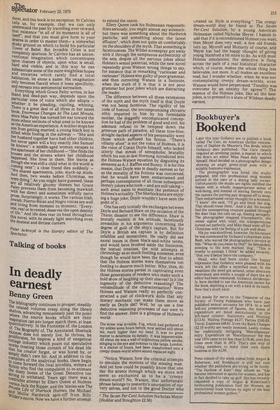Talking of books
In deadly
earnest
Benny Green
The bibliography continues to prosper; steadily the related volumes creep along the library shelves, advancing remoselessly past the point Where the source books which are their inspiration can any longer match them, at least quantitatively. In the Footsteps of, the London of, The Biography of, The Annotated. Sherlock Holmes does not merely live, he thrives, he Proliferates, he inspires a kind of exegetical cottage industry which pours out speculative w,, °tics treating those corners of his dead life that his creator forgot, or was bored by, or s,irriPly didn't care for. And in addition to the i'°MPilers of the analytical books, there begin g0 ecnIle forward the rival novelists, writers of action who find the compulsion to re-animate the dusty bones of the Great Detective too stronn, to withstand. Years ago there was a '_-reclitable attempt by Ellerv Queen at Holmes versus Jack the Ripper, and the 'sixties saw The Private Life of Sherlock Holmes, the Michael 1,11c1 Mollie Hardwick spin-off from Billy wilder's movie. Now we have a further attempt
to extend the canon.
Ellery Queen took his Holmesian responsibilities seriously, you might almost say solemnly.
but there was something about the Hardwick pastiche, and something about the latest effusion*, which does not quite sit comfortably on the shoulders of the myth. That something is facetiousness. The Wilder screenplay got away with it through the sumptuous authenticity of the sets, despite all the nervous jokes about Holmes's sexual potential, while the new novel repeatedly gives Watson wrong things to say, for instance that in remarking "curiouser and curiouser" Holmes was guilty of poor grammar, and then correcting Watson in a footnote, when the truth of it is that it is not poor grammar but poor jokes which are distracting the reader.
The difference between all these extensions of the myth and the myth itself is that Doyle was not being facetious. The rigidity of his code of honour, the uncompromising chivalric ethic imparted to him by his formidable mother, the doggedly uncomplicated conception he had of the problem of good and evil, his adamant refusal to be tempted down the primrose path of paradox, all these true-blue, straight-backed aspects of his personality were those which suffused his fiction. "There's villainy afoot" is not the voice of Holmes, it is the voice of Conan Doyle himself, who lacked utterly that streak of xenophobic brutality which his son-in-law Hornung introduced into the Holmes-Watson equation by disguising its elements as A. J. Raffles and Bunny. It is for this
reason, that Doyle was in deadly earnest so far as the morality of his fictions was concerned, that he would have been embarrassed and perhaps contemptuous of all those subsequent literary jokers who took — and are still taking — such great pains to maintain the pretence of Holmes's actuality. The Sherlockians are enjoying a huge joke; Doyle wouldn't have seen the point of it.
One has only to study the exchanges between Doyle and Bernard Shaw on the occasion of the Titanic disaster to see the difference. Shaw is brutally realistic in his attitude, facetiously irresistible in his arguments concerning the degree of guilt of the ship's captain. But for Doyle a British sea captain is by definition infallible and immaculate. He really did see moral issues in these black-and-white terms, and would have brushed aside the footnotes, the textual treatises, the wild attempts at chronology as so much footling nonsense, even
though he would have been the first to admit that the Holmes stories were themselves too
footling to deserve much better. Why, then, do the Holmes stories persist in captivating even those generations of readers who make such a bold show of laughing up their sleeves? Is it the ingenuity of the deductive reasoning? The verisimilitude of the characterisation? Were Holmes and Watson really so perfectly con structed a pair of clockwork dolls that any literary mechanic can make them move as easily as Doyle did? Well, let us use a few deductive reasoning processes of our own to find the answer. Here is a glimpse of Holmes's world:
The street was invisible. Fog, which had gathered at my ankles some hours before, now settled still about me, much higher than my head. It was no great matter to determine its density. It was impenetrable. All about me was a wall of sulphurous yellow smoke, stinging to the eye and noxious to the lungs. London, in a matter of hours, had been transformed into a creepy dream-world where sound replaced sight.
"Notice, Watson, how the criminal attempts to simulate the motions of the missing man. And yet how could he possibly know that one day the streets through which we move will seem so enchanted as to be a 'creepy dream-world'? No, Watson, that unfortunate phrase belongs to posterity's usurpation of our very selves, and not to the good Doctor who * The Seven Per-Cent Solution Nicholas Meyer (Hodder and Stoughton £2.50) created us. Style is everything." The creepy dream-world may be found in The Seven Per-Cent Solution, by a young American Holmesian called Nicholas Meyer. I hasten to add that if it is reconditioned Holmes you want, then Meyer does very well. A few old friends turn up, Mycroft and Moriarty of course, and Meyer has had the happy thought of giving young Stamford a bit more to do. As with most Holmes simulations, the detective is flung across the path of a real historical character which, of course, makes the whole thing less believable, not more. It all makes an excellent read, but I wonder whether, when he was not contemplating creepy dream-worlds, even Watson would have perpetrated "Timidity was overcome by an anxiety for egress"? The essence of the Holmes joke, like all the best jokes, is to pretend to a state of Wildean deadly earnest.


































 Previous page
Previous page